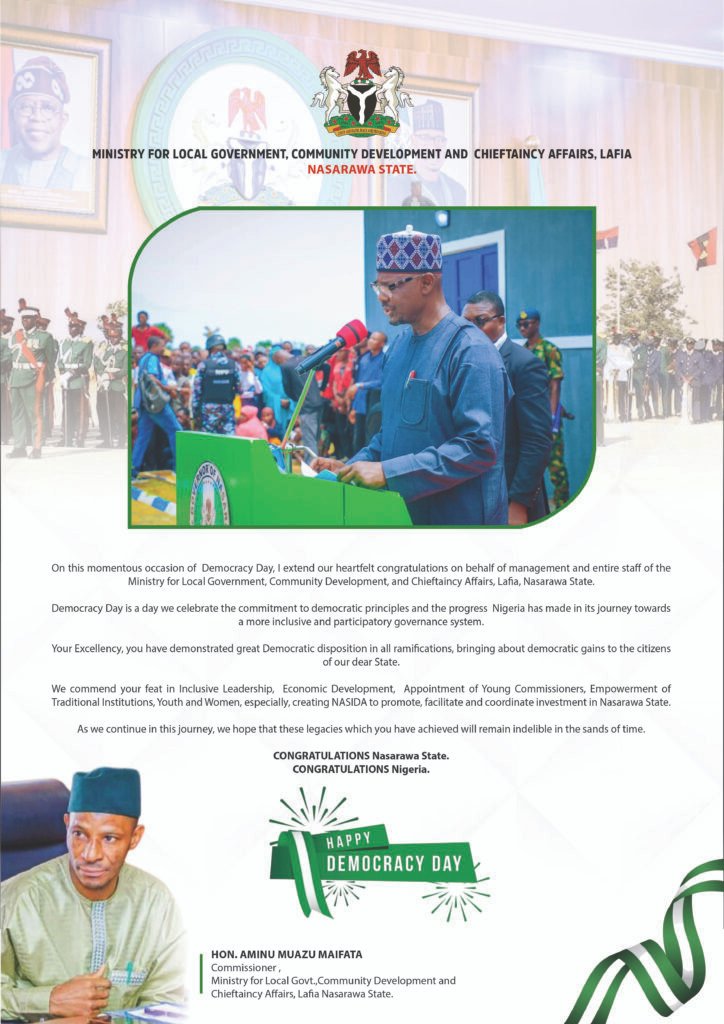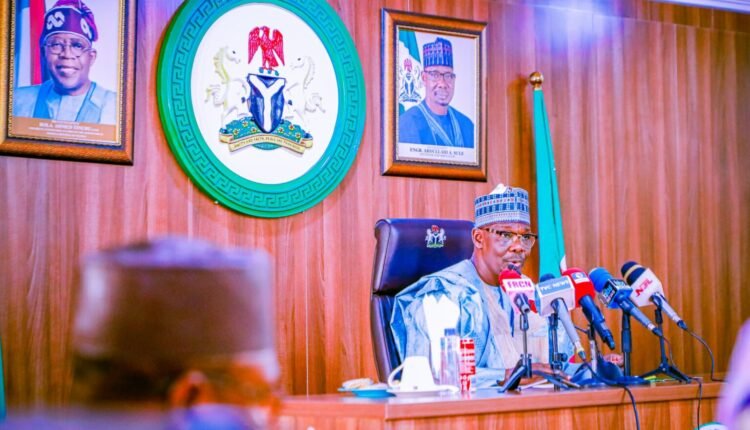Nasarawa State’s Transformation: Six Years of Visionary Leadership Under Governor Abdullahi A. Sule
Nasarawa State’s Transformation: Six Years of Visionary Leadership Under Governor Abdullahi A. Sule
By Hannatu Lot
Governor Abdullahi A. Sule’s six-year tenure as Governor of Nasarawa State has witnessed a remarkable transformation, moving the state from a position of relative obscurity to a burgeoning investment destination and a model of inclusive governance. Initially met with skepticism, his administration has defied expectations, delivering tangible improvements across various sectors and fostering a climate of trust and economic growth. This article details the key achievements that have cemented Governor Sule’s legacy as a visionary leader committed to sustainable development.

Infrastructure: A Foundation for Growth
Governor Sule’s administration has prioritized infrastructure development, recognizing it as the bedrock for economic progress. A significant achievement is the completion and test-running of a N16 billion flyover and underpass in Lafia, the state capital, a project widely praised by citizens for alleviating traffic congestion. This investment is part of a larger initiative to improve road networks across the state, enhancing connectivity and accessibility. Other notable infrastructural projects include the construction and rehabilitation of numerous roads, both urban and rural, along with bus terminals. The construction of the Shendam-Akurba dual carriageway, equipped with solar-powered streetlights, showcases the administration’s commitment to modernizing infrastructure.
Agriculture: Empowering Farmers, Ensuring Food Security
Recognizing agriculture as the backbone of Nasarawa’s economy, Governor Sule has implemented several initiatives to boost productivity and food security. These include the subsidized procurement and distribution of fertilizers, enabling farmers to increase yields. Furthermore, the administration has commenced work on cultivating 10,000 hectares of land for rice, maize, and sesame, creating jobs and enhancing economic prospects. The acquisition of modern rice harvesters from LOVOL Heavy Industries Company Ltd., along with the establishment of service centers and training programs, is a testament to the governor’s commitment to agricultural modernization. This commitment extends to supporting the establishment of cassava processing plants, adding value to locally produced crops and creating further employment opportunities.
Industrialization: Attracting Investment, Creating Jobs
Governor Sule’s administration has strategically positioned Nasarawa State as an industrial hub, leveraging the Nasarawa Economic Development Strategy (NEDS). The establishment of the Nasarawa Investment and Development Agency (NASIDA) has played a crucial role in attracting significant investments. The maiden and subsequent Nasarawa State Investment Summits have successfully lured investors, leading to the establishment of companies like Avatar New Energy Materials Co Ltd, Azgard Mining and Processing Plant, and the Nasarawa Technology Village. The discovery of oil and gas reserves in Keana and Obi local government areas, facilitated by the governor’s collaboration with the Federal Government and NNPCL, has opened up new avenues for economic diversification and growth. Furthermore, the significant investment in lithium processing, with multiple companies investing hundreds of millions of dollars in the state, showcases Nasarawa’s potential as a key player in the global lithium market. These projects have already created thousands of jobs and are poised to generate significant revenue for the state. The governor’s emphasis on attracting companies that process raw materials within the state, rather than simply exporting them, highlights his commitment to ensuring that the benefits of industrialization reach the local population.
Governance: Transparency, Accountability, and Inclusive Leadership
Governor Sule’s administration is characterized by a strong commitment to transparency and accountability. The proactive disclosure of all funds received by the state, including federal interventions and donor assistance, has instilled public trust. The meticulous management of the N3 billion flood relief fund, with the establishment of a dedicated account for its disbursement, further demonstrates the administration’s commitment to responsible use of public funds. The governor’s commitment to inclusive governance is evident in his active engagement with diverse stakeholders, including traditional leaders, women, youth groups, and people with disabilities, ensuring that all segments of society are empowered and represented. This inclusivity extends to his recent appointment of a cabinet with 60% youthful representation, demonstrating a commitment to empowering the next generation of leaders. The empowerment of 130 widows with N100,000 each and over 100 orphans with financial and food assistance underscores the administration’s focus on social welfare. His close collaboration with traditional institutions has fostered a sense of unity and strengthened community ties.
Read Also: NCC, Stakeholders Tackle Rural Connectivity Challenges
Security: A Priority for Development
Recognizing that security is crucial for sustainable development, Governor Sule has prioritized the safety and security of the state’s citizens. The provision of resources to security agencies has led to a significant reduction in crime rates, creating a safer and more conducive environment for investment and economic growth. The governor’s emphasis on unity and peaceful co-existence further contributes to maintaining stability within the state.
Healthcare: Expanding Access, Improving Quality
The Sule administration has made significant strides in healthcare, establishing the Nasarawa State Health Insurance Agency to provide affordable healthcare services. Improvements have been made to existing facilities, including the expansion of the Dalhatu Araf Specialist Hospital (DASH) Lafia, now a teaching hospital affiliated with the Federal University of Lafia. The construction of modern hospitals in Akwanga and Nasarawa Local Government Areas, along with the upgrading of primary healthcare centers, has expanded access to quality healthcare at the grassroots level.
Conclusion:
Governor Abdullahi A. Sule’s six years in office mark a period of significant transformation for Nasarawa State. His visionary leadership, coupled with a commitment to transparency, accountability, and inclusive governance, has yielded remarkable results across various sectors. The state is now a more attractive investment destination, with a vibrant economy poised for continued growth and development. As Nasarawa State continues on this trajectory, Governor Sule’s legacy will undoubtedly inspire future leaders and serve as a model for sustainable development in Nigeria.

